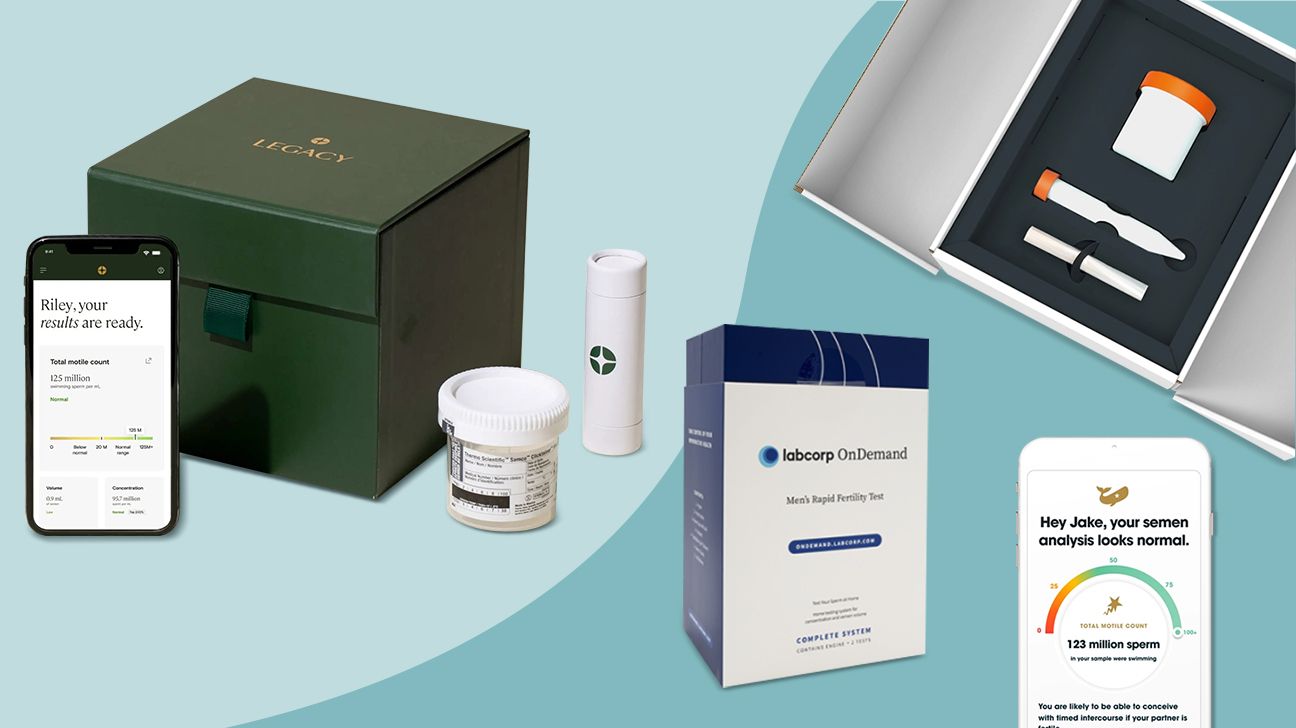Key takeaways
- At-home fertility tests for men can offer a glimpse into your fertility, but may still require a follow-up with a doctor.
- These tests typically assess one or more key factors, such as sperm count (the number of sperm present), motility (how the sperm move), and morphology (how the sperm are shaped).
- For an advanced sperm test, Legacy Semen Analysis is our top pick.
Fertility is a 50-50 deal: half egg, half sperm. So it probably isn’t coincidental that male fertility is a factor in
Male fertility testing can empower you with the knowledge you need to get the outcome you want — whether you and your partner are looking to get pregnant naturally, you’re donating sperm, or you’re planning to use a surrogate.
While a urologist can offer the most comprehensive information about male fertility, you can also start your journey without leaving home with at-home male fertility tests.
Let’s take a look at some of the best at-home fertility tests for men.
• count
• concentration
• motility
• morphology
• concentration
• concentration
• count
• motility
• total motile count
• morphology
• motility
• progressive motility
• motile sperm concentration
• progressively motile sperm concentration
How we chose the best at-home male fertility tests
Each test on our list has been vetted by our internal team for:
- medical credibility
- good business practices
- social impact
When deciding what to include on our list, we also looked for tests that provided more than just sperm count.
Male fertility tests generally involve a sperm analysis, which can indicate the health and viability of a person’s sperm.
A semen analysis looks at many factors. The three main ones to know about are:
- sperm count (how many sperm there are)
- motility (how the sperm move)
- morphology (how the sperm are shaped)
“At-home semen analysis testing will tell you if there’s sperm in the ejaculate,” said Dr. Amanda Kallen, an associate professor in the division of reproductive endocrinology and infertility at Yale Medicine. “Many will provide sperm quantity, but most won’t tell you if the sperm are moving (motility).”
In other words, some at-home semen analyses are not usually as detailed as doctor-ordered tests. Still, they can provide information as a starting point for people concerned about sperm count and quality.
It’s best to avoid sperm tests that look only at whether sperm is present or absent.
According to Kallen, sperm testing in a credentialed laboratory by a trained andrologist gives you much more information, such as morphology, volume of the ejaculate, the pH of the ejaculate, and more.
“These are critical factors in determining whether the sperm is adequate to fertilize an egg (and identifying whether male factor infertility is an issue),” she said.
Pros
- A home kit relieves you of the stress of providing a sperm sample in the doctor’s office.
- Your concerns remain private.
- The kits are quick and easy to use and are generally less expensive than in-office labs.
Cons
- Some home kits won’t give you all the information you need. While they can tell you if your sperm count is typical or not, these numbers are only one factor in male fertility.
- The range for low and optimal sperm counts varies between the kits.
- Some kits don’t measure sperm counts below certain levels.
While at-home male fertility tests offer a convenient starting point, they can’t provide a full picture of your reproductive health.
If you’ve been trying to conceive without success, or your at-home results raise concerns, it’s best to consult a doctor.
Clinical testing can assess hormone levels, anatomical issues, and rare conditions like normozoospermic infertility — factors that at-home kits can’t detect.
In some cases, imaging, biopsies, or genetic testing may be needed to identify the root cause of infertility.
You can test your sperm for fertility at home with at-home kits, like the carefully vetted kits on our list, or you can visit a urologist for in-office testing, comprehensive results, and next steps from your doctor.
It’s best to avoid sperm tests that look only at whether sperm is present or absent.
According to Kallen, sperm testing in a credentialed laboratory by a trained healthcare professional gives you much more information, such as morphology, volume of the ejaculate, the pH of the ejaculate, and more.
“These are critical factors in determining whether the sperm is adequate to fertilize an egg (and identifying whether male factor infertility is an issue),” she said.
A few signs, including low sex drive, erectile dysfunction, testicle pain, or swelling, may signal low sperm count.
Though there is seemingly no upper age limit for when males can continue to create new sperm, sperm quality lowers after age 40.
In particular, motility (the sperms ability to move) and morphology (the shape and structure of the sperm) tends to decrease with age.
At-home male fertility tests can help clue you in on the health and viability of your sperm.
If an at-home test or an in-office test suggests abnormalities, your healthcare professional can discuss any potential treatments with you.





